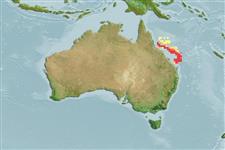Elasmobranchii (sharks and rays) >
Torpediniformes (Electric rays) >
Narcinidae (Numbfishes)
Etymology: nelsoni: Named after Gareth Jon Nelson, who was my PhD advisor at the American Museum of Natural History (New York), in honor of his very unique and meaningful contributions to both ichthyology and comparative biology in general.
Eponymy: Dr Gareth (Gary) Jon Nelson (d: 1937) is Emeritus Curator Vertebrate Zoology, Ichthyology, at the AMNH where he worked for over three decades (1967–1998), having been chairman of ichthyology (1982–1987) and of ichthyology and herpetology (1987–1993) [...] (Ref. 128868), visit book page.
Environment: milieu / climate zone / depth range / distribution range
Ecology
Marine; benthopelagic; depth range 140 - 540 m (Ref. 76955). Tropical; 16°S - 24°S, 147°E - 155°E (Ref. 114953)
Southwest Pacific: eastern Australia, probably more widespread in the Coral Sea
Length at first maturity / Size / Weight / Age
Maturity: Lm ?, range 19 - ? cm
Max length : 31.3 cm TL male/unsexed; (Ref. 76955); 34.8 cm TL (female)
Maturity size reaches ca. 26 cm TL; born at ca. 8 cm TL. Biology little known (Ref. 114953).
Life cycle and mating behavior
Maturity | Reproduction | Spawning | Eggs | Fecundity | Larvae
Last, P.R., W.T. White, M.R. de Carvalho, B. Séret, M.F.W. Stehmann and G.J.P. Naylor, 2016. Rays of the world. CSIRO Publishing, Comstock Publishing Associates. i-ix + 1-790. (Ref. 114953)
IUCN Red List Status (Ref. 130435: Version 2024-1)
Threat to humans
Harmless
Human uses
Tools
Special reports
Download XML
Internet sources
Estimates based on models
Preferred temperature (Ref.
123201): 15.6 - 21.4, mean 18.8 °C (based on 21 cells).
Phylogenetic diversity index (Ref.
82804): PD
50 = 0.5312 [Uniqueness, from 0.5 = low to 2.0 = high].
Bayesian length-weight: a=0.01175 (0.00470 - 0.02937), b=2.88 (2.66 - 3.10), in cm total length, based on LWR estimates for this (Sub)family-body shape (Ref.
93245).
Trophic level (Ref.
69278): 3.3 ±0.4 se; based on size and trophs of closest relatives
Fishing Vulnerability (Ref.
59153): Low vulnerability (25 of 100).
